I gave blood today. Despite the fact that, at the moment, I’m not renewing my visa, because ElBeuRitJi is taking over my contract it has to be “revised” with the Korean authorities. As a consequence of this, I’m forced to now comply several regulations that were changed or created by the Korean immigration service since the date that my original visa and residence permit were approved 10-11 months ago – even though, technically speaking, I have only approximately 6 weeks left on the current visa.
One of those requirements is that I have to provide a “criminal background check” (also being called a “proof of lack of criminal record”). This is a hassle, because as far as the U.S. consul is concerned, there’s nothing they can do to assist U.S. citizens who need this kind of paperwork. I have to somehow work with my “local authorities” in the U.S. to get this resolved. I’m still researching, but given the dearth of clear information online on how a U.S. citizen resident abroad can most easily accomplish this, I will try to post whatever I figure out – maybe others can find it in this blog and it will help them. But no answers yet.
Another requirement is that I have to get a medical checkup – really, it’s only a blood test for a few communicable diseases and a urine test for drugs, I think. So today I went to a hospital with a member of the ElBeuRitJi staff and two other foreign teachers in similar predicaments to get poked and proded. Here’s where they took my blood.

![]()
Caveat: 1%
I had a melancholy weekend. I guess I'm feeling depressed about what's happening with work. I won't dwell on it here… suffice to say it interfered with my ability to enjoy my weekend.
I spend a lot of time messing with my computer – trying to get my linux install working correctly again, after having hosed it a week or so ago by trying to upgrade to the allegedly latest and greatest ubuntu. I'm still not happy with it. I'm spending way too much time logged in using Windows Vista – hmm, maybe that's why I feel depressed, as that's the sort of operating system that could depress anyone.
I've downloaded and watched a lot of Korean dramas and TV serials lately. Trying to improve my listening skills, while watching the subtitles. From a language standpoint, it's so discouraging.
One series I got kind of hooked on was 1%의 어떤것 (translated idiomatically as "one percent of anything"), basically an extended romantic comedy-drama, with weird subtexts around issues of contract-driven relationships vis-a-vis traditional and western/romantic notions of marriage, as well as some unsettling sidelong glances at the fact of men acting violent against women. But it was funny, most of the lead characters were entertaining and reasonably plausible. It was mindless avoidance of the things that are bothering me.
Caveat: Portraits and goodbyes
According to my TP1M class, today is the last time we’re meeting. I’m not sure if this is true, but because of the merger with ElBeuRitJi, it might be – things are rather vague and uncertain around here lately.
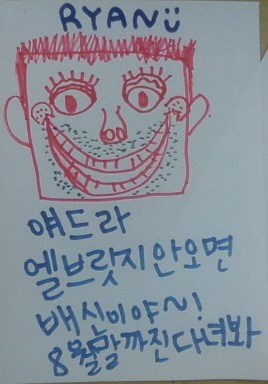 So, because of that, I was feeling kind of sad, as I wanted to take the time to express my goodbyes to them well, and maybe even come up with a parting gift of some kind, or at least a little note. When we last met, Uijeong drew some bizarre, picassoish portraits of some of the teachers here, and my feelings were a little bit hurt because she spelled my name wrong, although she apologized when I complained about it and said it was a joke. I snapped pictures of her portraits with my cellphone’s camera.
So, because of that, I was feeling kind of sad, as I wanted to take the time to express my goodbyes to them well, and maybe even come up with a parting gift of some kind, or at least a little note. When we last met, Uijeong drew some bizarre, picassoish portraits of some of the teachers here, and my feelings were a little bit hurt because she spelled my name wrong, although she apologized when I complained about it and said it was a joke. I snapped pictures of her portraits with my cellphone’s camera.
The lettering under Ryan says, roughly “If you don’t come to ElBeuRitJi you are traitors” (I don’t know the exact translation, but this is approximate). I guess the idea is to convey the enthusiasm which Ryan has been showing for the new school – he always is very gung ho about whatever he does, and has always been a hardcore pitchman for whoever the current management is, so this is a plausible paraphrase, I’m sure.
![]()
Caveat: Comunistas y Anarquistas
Vicente Huidobro, el poeta chileno que, seguramente, he mencionado más de una vez, escribió, "Es incomprensible que un individuo que haya estudiado profundamente la sociedad actual no sea comunista. Es incomprensible que un individuo que haya estudiado profundamente el comunismo, no sea anarquista." El hecho de que la cita ya lleva unos cuantos 70 u 80 años de edad no parece alterar su esencia verdadera fundamental.
Pero… ¿y en quién se convierte él que haya estudiado el anarquismo? Pienso en la situación de los llamados "estados fracasados," por ejemplo la de Somalia. Porque eso sí es el anarquismo verdadero, ¿no? Quisiera decir que él que estudiara el anarquismo se convertiría en libertario, pero no creo que sea la verdad, al menos en la mayoría de los casos. Parece más probable que el anarquista frustrado se vuelva al lado autoritario, sea fascista o leninista. Nos da un resultado deprimente, entonces. Y circular.
Caveat: … or un-postponement
We were talking, in one of my classes, about the upcoming dissolution of LinguaForum and absorption into LBridge. One of my students said she didn't like LBridge, so I asked her why. She mumbled something about "people say things," and so I interpreted, "rumors?" She and another student nodded.
"What rumors?" I asked. She sat up a little bit, and looked me in the eyes. Then she ticked off on her fingers, while speaking with a clearly enunciated English: "bad students, bad curriculum, bad teachers…" One. Two. Three strikes. You're out.
Wow. I was surprised. Both at the content of what she said, but also with the sudden confidence and classical rhetorical flair with which she spoke. This was serious. Nevertheless, I started laughing – I think it was because of the irony of the situation, which was impossible to communicate to my students. That fact is, after never getting much in the way of clarity from my colleagues, nor especially from the incoming new bosses, I was getting a remarkably straightforward declaration from such an unexpected source.
Is it wrong of me to want to give more credence to my students and their "rumors" than to my colleagues or bosses? Is it wrong for me to feel that this whole merger has been handled with a rather cavalier disregard for the staff and students here at LinguaForum? And is it wrong for me to feel that this cavalier attitude is, ultimately, a poor reflection on the character of my new bosses?
This in-class discussion happened Monday night. Then, yesterday, the main boss from ElBeuRitJi came by and said to me something to the effect that we needed to discuss paperwork for my new contract. As if my decision to stay were a done deal. This caused me some stirrings of annoyance and resentment, and I repeatedly parsed the very short exchange we had had, wondering if I had misunderstood. And it's possible I did misunderstand – no one's English here is flawless – but I don't think so.
Further, I still have been unable to shake the impression I got from the principal of the Hugok campus (which is where I will be working and therefore the person to whom I will be directly reporting) that I really wasn't wanted there – that I was being forced on him by his boss, and by the circumstances of the merger, against his own wishes. Nobody wants to work for a boss that doesn't want him around, right?
Really, am I being culturally naive? I have almost no doubt that I am! Yet that doesn't in any way change my gut feelings.
So, after having made the decision on Monday to postpone my decision on renewal for another month and take a "wait and see" attitude, I'm suddenly leaning very much away from the idea of renewing. I sent an email to the new boss last night, to try to make very clear that I hadn't yet consented to a renewal. And to that email, there has been no response… silence. Which has been par for the course with these new ElBeuRitJi people – they are remarkably bad at communicating.
If there is anything I learned during my years working in the corporate world, it's that new and incoming bosses who fail to communicate well are going to piss off both customers and staff. Transitions of this sort need to be handled with a great deal of sensitivity and a whole lot of clear communication, especially where there are to be notable changes in organization and strategy, which this merger situation clearly holds in spades.
It can be very easy for staff (teachers, in this case) and customers (students and parents, in this case) to be left feeling alienated and ignored, if communication isn't managed well. And I think that is exactly what's happening. Parents and students are fleeing, or else shrugging their shoulders resignedly and saying "I don't know." The teachers and staff here are all grumbling and acting pissed off, regardless of what decision they're taking. The mood in the hagwon has shifted from gray to black, and more than one person has been quietly muttering the word "arrogant" as a description of the new management, which is an indicator that I'm not completely off base in my feelings.
I'm thinking… maybe best for me to move on. So much for postponing my decision – I think I've made it.
Caveat: Just a mass-murderer, after all
I finally finished the Death Note manga series the other day, and I have to admit feeling slightly disappointed in how it all pans out, although I enjoyed how the authors kept me guessing right up to the end. Light (Kira) – the main protagonist – turns out to be nothing more than a mass murderer, after all is said and done. The point being: the victors are righteous, and the losers are criminals, right? And his shinigami (a being from another realm that enables the death note powers in our world to begin with) is who kills him, ultimately. I really have no idea what sort of ending would have been more satisfying… I'll have to contemplate that.
Caveat: Postponement
After several weeks of anxiety over whether or not to renew my contract with ElBeuRitJi (the hagwon taking over my current employer at the end of this month), partly because of it being a bit of an unknown, now I've managed to simply postpone the decision. ElBeuRitJi will "inherit" my existing contract, which ends at the end of August. So I have to work for them, regardless, for one month. That will give me a chance to get a feel for how they are, and for them to get a feel for how I am. Essentially, I will just not sign anything until down the road a month.
Meanwhile, I've decided to make a halfhearted commitment to the Obama campaign – I signed up on his social networking site my.barackobama.com. As I've said some months back, I was more of a Richardson supporter (although even that had its ambivalences because of my libertarian tendencies), but I'm so certain we need to exclude the Republicans from government (given that they have behaved in such frighteningly unlibertarian ways – in everything from size-of-government to social policy to civil liberties to foreign policy), that I've decied to just come out and openly support Obama – for what it's worth.
Caveat: Lyric Babel
One thing I have been doing to improve my Korean is downloading Korean pop music (mostly pretty randomly, and not very focused on whether I like it or not), then finding the lyrics so I can try to learn to sing along a little bit. Here is a fragment of the first song I grabbed that way, some months ago, and then forgot about.
나를 불렀던 똑같은 호칭으로 그 사람을 부르고
내가 널 데려 간 곳들을 그 사람 손잡고
마치 처음가보는 사람처럼 설레이는 척하며
모든 게 나와 함께했던 소중한 추억들인데
그 사람과 다시하면 다 지워질텐데
우리추억들을 왜 지우는데 왜왜Nareul bulleottteon ttokkkateun hochingeuro geu sarameul bureugo
naega neol deryeo gan gottteureul geu saram sonjapkko
machi cheo-eumgaboneun saramcheoreom seolle-ineun cheokhamyeo
modeun ge nawa hamkkehaettteon sojunghan chu-eoktteurinde
geu saramgwa dashihamyeon da jiweojiltende
urichu-eokttereul wae ji-uneunde waewae[Calling at him as if you were calling me
Holding his hands at those places where I hold yours
You seem so excited as if it’s your first time
The precious memories you’ve had with me
You’ve wiped them all away
While creating a new one with him
Why do you want to wipe away our memories?
Why? Why?]
The artist is Rain (Bi) [Bi=Rain in Korean], the song is called "In my bed." Lyrics, romanization and translation courtesy various random websites. It's an effort, anyway.
Caveat: Be Yoyr Own Brain
The other day, I saw one of those remarkably bizarre English compositions that occasionally crop up on clothing. There was a man standing on the subway platform at Gasan, down in Seoul. On the back of his shirt was the text, “GENDER BE YOYR OWN BRAIN HYSTERIC VINTAGE MODERN.” I couldn’t resist surreptitiously snapping a photograph of it – it was too unique to ignore. But now I wonder what it means.
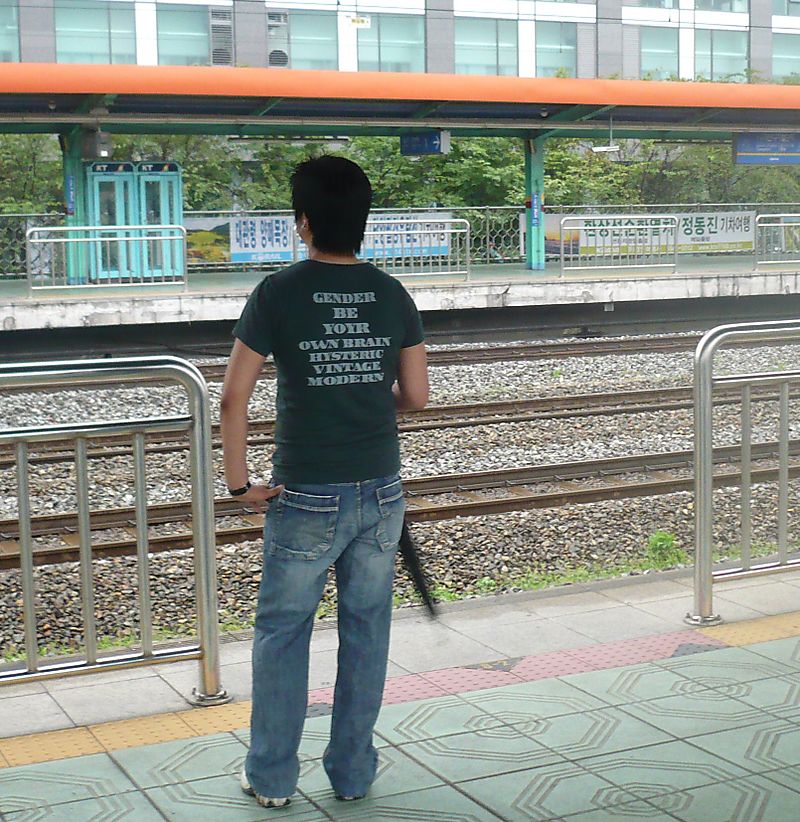
After taking the guy’s picture on the platform, I spun around and took some other pictures from the platform, which overlooked a typically busy Seoul street. The day was rainy and overcast, and the air was thick with humidity. The tires of the cars on the street below made that subtle, sweet, hissing sound that tires make when roads are wet. It’s a sound I find weirdly peace-inducing.
Caveat: 어린왕자

Sometime back I bought Le Petit Prince, in a trilingual edition. Recently I’ve been trying to read little bits of it – the Korean part. It’s fun to do that with a text as familiar as this one is. I was talking about it with someone at work the other day, and realized that the book has the peculiar distinction of being the book I’ve read (or tried to read) in the most different languages. I even remember once trying to decipher the Arabic version, though I made very little progress. I love the story.
The story starts, “나는 여섯 살 때에” (na-neun yeo-seot sal ttae-e) => I-[TOPIC] six [YEAR-COUNTER] time-[AT] => at the time I was six years old…
![]()
Caveat: Stay or Go?
Some observations regarding the conquest of LinguaForum by LBridge, and my own prospects.
I first met the new ubermanager at LBridge (president?), Andy, on Monday. I had an initial interview with him and then a second interview yesterday (Wednesday), in which he confirmed an offer to renew my contract and have me work as a teacher at the Hugok campus (elementary students), probably mostly teaching advanced-level speaking/writing; a higher degree of specialization is possible because of the larger size of the academy, and this is actually rather appealing to me, as I seem to do my very best with those high-level elementary students.
I told Andy I could not offer a firm yes or no at the moment of the interview, explaining that, as a result of the chaos of the merger of Tomorrow into RingGuAPoReom in January, as well as the general rumors circulating about the current situation, I was feeling a little bit "gun shy" about making a commitment. I said I wanted to understand better the curriculum I would be asked to teach, and maybe meet with my prospective managers, etc., before making a decision.
And last night we all went out to dinner (Andy plus most of the staff of our current academy). Andy somewhat offended me with a few repeated observations in the vein of "Jared doesn't like me, I don't think," and "can't we just be friends." He was interpreting my standoffishness with respect to the job offer as coolness to him personally. And I admitted that I am a shy person, in general, and slow to open and be trusting. I tried very hard to understand it all as a matter of cultural differences, combined with a bit too much soju (Korean firewater) circulating.
So Andy told me, last night, to go over to the Hugok campus today at 2 pm and talk to someone there (a manager? a VP of some kind? – his title wasn't clear to me at the time, though I know now that he's the VP there). Frankly, the ensuing situation was almost comedic.
The man at Hugok campus today told me that he had no idea I would be coming. Further, he in fact had not been informed that he would be receiving any new teaching staff of any kind from the two RingGuAPoReom academies being absorbed. And that, in fact, he had no open positions for teacher until at least September. I was puzzled. What's worse, he then launched into a complaint about the fact that although he had been led to expect, by Andy, at least 50 new elementary students as a result of the merger(s), in fact, based on a parental informational meeting held yesterday, at this point he was realistically expecting at most 10 or 15. Therefore he was even more puzzled by the idea that he would be taking on more staff at the end of July, when the two RingGuAPoReom campuses close.
And so I left, wondering what the heck was going on. Shortly thereafter, I spoke to Andy on the telephone, who apologized for what had happened (which he'd had conveyed to him by Curt, to whom I'd reported), and he said there was a misunderstanding. But it kind of makes me wonder about the reliability of the this whole enterprise, and the experience ties in with rumors that I've heard in a few places (not to name any names) that ElBeuRitJi is bureaucratic and impersonal when it comes to dealing with its staff.
Anyway, Andy asked if it would be possible for me to return right away to LBridge, as he had just had a telephone conversation with the manager there, presumably remediating the information deficit that clearly existed. I went back over to the academy – it's only a block away, down "Academy Road" as us foreigners call it (a street with an inordinate number of hagwon all up and down it for several kilometers continuously). And again, I spoke with the man who would be my putative new supervisor, and then I had a long and very interesting conversation with the man whom I would be replacing – an American named Doug.
Doug was at a whole different level of professionalism from any other foreign English teacher I've met, to date, in Korea. He is only wrapping up a one year contract with LBridge, but his reasons for putting in only one year were plausible, and were not linked to a negative experience with the hagwon, which he spent some time praising. The teachers are in teams of four, and each team is allocated to one level of student ability. So in moving from my current job to LBridge, I would be moving from generalist (grades 3-9, all ability levels) to specialist (grades 4-6, one ability level). Doug's team teaches the most most advanced level, which bears the saccharine-sounding (and patently un-English!) name of "ElDorado."
But I liked the curriculum, and it was easy for me to see my place in it. Which is what I was hoping to find, of course. Doug had been working previously as a history teacher in the States, and he'd integrated his interest and competence in that subject area to a partly self-designed curriculum not completely unlike the debate program I've enjoyed working with at my current job. He expressed positive feelings about the academy, and the chance to look at the materials and the teachers' prep space and the atmosphere there was, overall, encouraging. Then again, what departing employees tell their incoming potential replacements is never the whole story (as I know from sitting on the other side of the fence, more than once), and so I tried hard to read between the lines, too.
I went back to LinguaForum and graded some essay books, and chatted with Curt and Grace about the situation. Feeling stuck in the need to make this decision – should I renew or not?
When I got into my ER2 class today, I was moody and indecisive about the whole thing. And the kids had just completed taking the placement test for the new academy, so they were wound up and uninterested in the materials at hand, either. Further, because of the upcoming changes, I already knew that we weren't going to complete this month's unit, in any event – we only had basically two weeks left before the kids transfer into whatever new school they go to (whether that's ElBeuRitJi or something else is up them and their parents, obviously). With these thoughts in my mind, I made a snap judgment and decided to hold an impromptu debate on a topic that immediately had them all riveted in attention: Should Jared go to ElBeuRitJi? Pro or con?
Including them in my decision-making process, so-to-speak. Based on the above-mentioned offer, these students would be among those most likely, by far, to "stick with me." And after I had explained some things to them, they realized this. So we had a pretty brilliant in-class conversation about "Jared's dilemma," as I wrote it on the whiteboard. And perhaps unsurprisingly, they all ended up taking the "Pro" side in the informal debate, leaving me to debate the cons. But that was exactly the sort of experience I'd been looking for, actually. A chance to get outside of myself a little bit and openly discuss the merits and disadvantages of this one-year contract renewal on offer.
I even went so far as to outline a clear sub-part of the debate, which is my own questioning as to whether I want to stay in Korea or "move on." This was not something they could relate to as easily. "Of course" Jared wanted to stay in Korea. So that's a part of the issue that I will have to resolve on my own. But if we take as "given" that I want to stay in Korea, the outcome of our discussion is that moving to ElBeuRitJi is a good idea: it seems to offer a chance to work with the age group and ability level where I've felt my greatest successes; the institution is big and highly professionalized, which is an environment where I've excelled in the past; it provides geographical and social stability, since I'd probably stay in my same apartment and have many of the same colleagues, with other previous colleagues still nearby for social purposes; and it would give me a chance to remain "loyal" to at least some of my charges – those who opt to go to ElBeuRitJi themselves (or, rather, those whose parents so opt), and who get placed into the same ability level that I do.
So there you have it. To quote The Clash: "should I stay or should I go?"
Caveat: Reading Some “Found Korean”
One thing I often do is try to decipher the "found Korean" in my environs. I randomly look at signs, graffiti, etc., for phrases or words I'm curious about, and fiddle them into the dictionary in my cell phone to find out what they mean, to try to make sense of them.
In the stairway of my building as I came home tonight, I found a scattering of abandoned business cards for a Buddhist 도사 (do-sa, teacher). I brought one of the cards home and decided to read it. A bit more challenging than just words on a sign. Here's what I came up with – and the translations are tentative and in no way authoritative.
내 운명은 내가 알아야 성공할수 있다!
nae un-myeong-eun nae-ga ar-a-ya seong-gong-hal-su iss-da
My fate-TOPIC I-SUBJECT know-NECESSITY take-on-ABILITY there-is
I must know my fate in order to take it on.
"사주팔자"는 바꿀수 없어도 운명은 바꿀수 있다.
sa-ju-pal-ja-neun ba-kkul-su eops-eo-do un-myeong-eun ba-kkul-su iss-da
"Destiny"-TOPIC change-ABILITY there-isn't-ALSO fate-TOPIC change-ABILITY there-is
"Destiny" cannot be changed yet fate can be changed.
These are very Buddhist-sounding aphorisms, which leads me to think I'm at least on the right track as far as making sense of them.
There's probably something going on with the different vocabulary items indicating destiny, e.g. 사주팔자 (hanja:四柱八字) vs 운명 (hanja:運命). Naver.com tells me that the former refers to the Four Pillars and Eight Characters (which is the day and time of one's birth, hence, via astrological notions, one's destiny), while the latter is just basic fate or fortune. So with that understanding, it's saying that although obviously we cannot change the date and time of our birth (and hence, we cannot mess with the "stars" that shape our lives), we nevertheless control our fate. The whole free will problem, right?
Who knows? It's fun to try figuring it out, anyway.
Caveat: An Aimless Drive
"Life is an aimless drive that ya take alone. Might as well enjoy the ride, take the long way home." This is the chorus from the Bloodhound Gang's song, "Take the Long Way Home." I'm not sure that I have anything specific to say about this. But it's a good quote. And right now, I'm listening to the Beastie Boys.
On NPR, earlier, I heard a man named Tom Segev being interviewed. He's a columnist for the newspaper Ha'aretz (Israel), and was talking about the whole question of to what degree the Israeli government interacts with groups such Hezbollah or Hamas. He said (and, because this is overheard on the radio, I don't know that it's a perfect quote), "We claim never to be negotiating with terrorists. In fact, we are always negotiating – every government in the world is always negotiating – with terrorists."
This struck me as profoundly and fundamentally true, and puts lie to the constantly enunciated position of most governments that "negotiating with terrorists" is neither appropriate nor ever pursued as a matter of policy – "so as not to encourage them" so to speak.
I would only like to add further to his observation, by wondering: if this [i.e. "negotiation"] did not occur, with great regularity, mightn't terrorists eventually abandon their activities as fruitless? Terrorists are successful with their generally ideological missions mostly to the extent to which the terror they sow can induce governments to react and change policies, cede resources, or capitulate. This has always been true, and all war is, ultimately, terrorist in nature, and just an extension of politics by other means, as the aphorism has it.
And now I'm listening to Radiohead's "Backdrifts."
Caveat: 식민주의 학원을 말해요…
I will talk about “academy colonialism.” It’s not my idea, actually. My ER2 students suggested it to me. [In what follows, note that I am “round-trip-romanizing” the names of the Korean businesses in question, to protect (somewhat) their online anonymity. Maybe, down below, I’ll explain what I mean by “round-trip-romanizing.”]
First of all, if I haven’t made it clear before: after only 6 months of existence, it turns out that RingGuAPoReom EoHagWon (my current employer, and the result of the buyout in December of the Tomorrow School-my original employer) is ceasing to exist. It’s what they call a “reverse merger” in the world of business. The parent company to the RingGuAPoReom EoHagWon has invested in a “healthier” and much larger academy business called ElBeuRitJi EoHagWon, and they are spinning off their tiny and just-started-out English academy business and merging it into this other business. So although the underlying ownership isn’t changing, RingGuAPoReom EoHagWon is being swallowed by ElBeuRitJi EoHagWon.
Naturally, the mood around work is grayish. All the students are being forced to move into a new curriculum once again, and a new environment. Our current campus will be closed completely, and the elementary-schoolers will go to one currently existing ElBeuRitJi campus, where there are already 500-odd students, and the middle-schoolers will be off to another already extant ElBeuRitJi campus, with a similar enrollment. And the high-schoolers are off in limbo somewhere, since ElBeuRitJi doesn’t do high-schoolers.
Since we can’t teach at both campuses, we teachers are being forced to make a catch-22 choice: middle-schoolers or elementary-schoolers. And with only two months left on my contract, I’m just kind of shrugging and smiling and biding my time. If the new environment is sufficiently appealing, I haven’t even ruled out the possibility of renewing, yet. Who knows?
Anyway, my ER2 students made a telling and semiotically loaded comparison in class today, when we were discussing the upcoming change. They said that RingGuAPoReom was Korea, and that ElBeuRitJi was Japan. Gavin nodded, grimly, and Tina made a disgusted face. The reference was obvious to all of us: we were discussing an act of vicious colonial conquest. Korea was conquered (“annexed”) by Japan in 1910, and suffered 35 years of brutal occupation and subjugation which left indelible scars on the national psyche. So it was no insignificant thing that they would make such a comparison. Given the cultural baggage, I’d never had dared put such a concept on the table.
When we first learned of the impending absorption of the academy, I had made the comment to Ryan that it was really mostly unfair to the children. Most children crave stability, and require it to thrive, and forcing two massive changes in less than a year – including changes to everything from curriculum and physical location to teaching staff and curriculum – was essentially going to prove psychologically traumatic for them. I mentioned the names of several timid and behaviorally challenging elementary-schoolers as case-in-point. Some of them had taken several months to get over the shift away from the Tomorrow School.
The ER2 students comments, today, confirmed that these students are neither ignorant of what’s going on, nor are they in any way neutral observers: they clearly have strong opinions and feelings about it, and I suspect very little attention will be paid them.
Footnote, RE my practice of “round-trip-romanizing.” Most of these English academies (어학원=EoHagWon), here, have English-based names, naturally. But in most internal documentation, and even in advertising literature, these English-based names are hangeulized (konglishified, i.e. rendered in the Korean alphabet). If you re-romanize the resulting hangeul following the official hangeul-to-roman rules, you get something that is generally unrecognizable as English at all, and in any event no longer recognizable as the original English names of the academies in question.
An example. Let’s say I have an academy called Happy School. I can hangeulize this as 해피스쿨, and then re-romanize this to HaePiSeuKul. See? It renders the name of the school “anonymous” to search engines, which are not in the least sophisticated when it comes to questions of inter-alphabetic transliterations. I think.
Caveat: existentialist-in-chief
I was reading an article discussing General Clark's recent comments regarding McCain's qualifications to be "commander-in-chief." (The thought being, roughly, that having been a prisoner-of-war is brave and shows strong character, but isn't the same as command experience.) I was thinking about that phrase, commander-in-chief. And began toying with the idea of McCain as "prisoner-of-war-in-chief," reflecting on the way that a person's formative experiences and character can come to define a presidency: Nixon as rogue-in-chief, Reagan as movie-star-in-chief, Clinton as bubba-in-chief.
In this vein, and if McCain is to be prisoner-of-war-in-chief, what would Obama be? I think about aspects of his character and formative experiences, and think, maybe something like community-activist-in-chief? Perhaps, less charitably, he could become our Urkel-in-chief. There's definitely something to the idea that, like the sitcom prototype (the legendary Urkel), Obama manages to transcend racial and cultural stereotypes in part through his nerdiness – which is to say, nerdiness as an essential stereotype runs "deeper" than race. Which actually says something pretty positive about the state of race relations in America, maybe. I think it was Joel Stein who first suggested the comparison between Obama and Urkel, but I don't know that most of the comparisons have been entirely meant to be positive. Still… who am I, as pale white ubernerd, to judge?
Caveat: 고시
Actually, I have nothing to say, today. I didn’t think about what I might post here, and my mind is currently kinda blank.
Here is a picture I took with my camera phone just outside of the back exit to my building, earlier. I thought the sky looked cool, but it didn’t really come out in the picture. On the other hand, the building across the way, with all its advertising, looks very colorful.

![]()
Caveat: Parlez Hançais?
Konglish (Koreanized English, sometimes also called Engrish, though that term also includes Japanized English, and I don’t really like that term) permeates Korean popular culture, especially in the spheres of marketing. Konglish exists at several different levels, from more-or-less correct English messages attached to advertising, to random English words or pseudo-English words plastered on t-shirts, to “hangeulized” English in the form of minimally adapted loanwords into Korean, and especially used as product names and brand names.
Many examples of “hangeulized” English (i.e. English written using the Korean writing system, and adapted therefore to Korean phonology) can be found on the shelves of the grocery store. Here is an example:

This is a brand of iced coffee that I buy. The cursive-looking hangeul at the top spells out “Kantata” (i.e. Cantata, as in a piece of music), then right under that in smaller letters it says “orijineol wondu keopi” (original wondu coffee). The phrase “wondu keopi” repeats under the coffee beans picture, and then it says “peurimieom beullendeu pollipenol 100 mg” (premium blend polyphenol 100mg). See how that works?
Ok, actually what I want to write about is what appears to be an emerging related phenomenon, which is the use of “hangeulized” French, also in marketing. The advantages seem to be a) French has a novelty factor, while English is rather worn out, b) French has the same high-social-status element that English does, but with less historical and geopolitical baggage (at least here in Korea – don’t try this in e.g. Vietnam).
What’s really interesting, to me, is the subtle way that the French phonological system, as represented using the Latin alphabet, is hangeulized differently for a given etymon than would be done for an identical word in English. Here is a bakery that just opened a few blocks west of here (and note the use of perfectly acceptable English in the supporting text to the brand-name):

The sign’s hangeul reads “bon geurang bageteu” (which is bon grand baguette in French – bad French, actually, since it messes up the gender agreement between the adjectives and the noun, I think). The word “grand” is common enough in both French and English, and if it were an English word being hangeulized, they’d do something more along the lines of “geuraendeu,” but, because it’s French, they capture the different quality of the french vowel, along with the nasalized ending, by doing it as “geurang.”
I’m sure very few people find this as fascinating as I do. I can’t make excuses for my stupid interests. But I’ve decided this hangeulized French needs a name, along the lines of the term Konglish. And I think “Hançais” is just perfect – “han” meaning Korean (in Korean), and -çais for the French part, of course.
![]()
Caveat: Crazy about Crazy
The Korean word for “crazy” is “미친” (mi-chin).
When we say someone or something is crazy, in English, there’s not really a value judgment involved – at least, it’s not a very strong one. Being a child of the 60’s, myself, I would go so far as to say that there are plenty of times when the word “crazy” can be used to mean something almost complementary. As when you’re sitting, reminiscing with friends, and someone says, “those sure were crazy times.”
But if you say someone is “michin” in Korean, it’s a grave insult – at least on the level of “son of a bitch” according to some of my students, if not a great deal worse. There’s a great deal of cultural anxiety about craziness, here. And this got me to thinking about the issue with the madness about mad cow disease and the national paranoia over American beef imports.
Perhaps the real problem is the name of the disease. If it were only ever called Bovine Spongiform Encephalopathy (BSE), would anyone care about it, in its extreme rarity? Did the British name the disease unpropitiously? Are Koreans going crazy and rioting in the streets because of a crazy fear of craziness and of a crazily named disease?
What might Foucault have to say about that? And how might this national anxiety about craziness impact the reception of a text such as Don Quijote? Maybe I should research this – I saw a Korean language edition of DQ on sale at Kyobo the last time I was there. Maybe I’ll pick it up, and try to decipher clues to its reception. Ha… as if my Korean were even close to being up to the task. But it’s an interesting question, I think.
Here’s a coworker at the hagwon. He remains nameless.
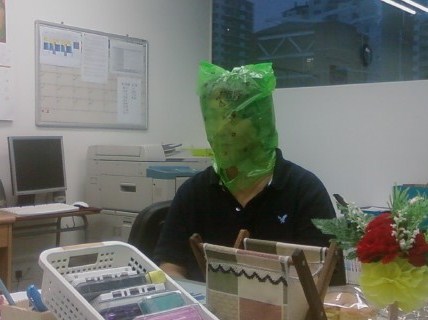
![]()
Caveat: “나의 이미지”
A student of mine writes about her self image.
My image is white. White means glitter, truth, objectivity… I am very strange. I am do not planning. I just do inclined self or ask other people. I have truth for other people. I’m greeting to other adults. And I’m extremely obstinate. I am elementary school grade 4th. We eat dinner with relation. I said “I want sit here.” but, mother said, “No.” Finally, I am sit there. This is, I want to do, I do until end. I am uneasiness. I am coward. At saturday, I talk with church sister and friend about scary stories. I don’t like scary. I listen scary stories to other people, so, I don’t close window. My sister day, “You are fool and coward. It’s not scary!” As a result, I hit my sister. But, I’m really thank My sister.
I didn’t give her high marks for organization, but I told her it was a very vivid essay that had almost poetic properties. Which is what I think.
![]()
Caveat: If you can’t avoid it, enjoy it!
The sentence "if you can't avoid it, enjoy it!" was the cheery conclusion of a 5th grader's essay that I was grading today. I liked the philosophical sentiment of it, though I also thought it has an unspoken corollary: "if you CAN avoid it, then, by all means, do so." Some things in life are unavoidable, and we should take those things with calm, equanimity, and even try to enjoy them. But other things in life are clearly avoidable, yet all too often, we just keep putting up with them, tolerating them, letting them annoy us, when it would be all too easy to walk away from these things, or push them out of our way and move on. Sometimes I think we possess an excessive loyalty to the status quo, whatever it is.
Which brings me back to the "why" of my current adventure – vis-a-vis my ruminations about whether to renew my contract or not. Clearly, because of the option to renew, I am in an "avoidable" situation, as far as continuing my experience here. So the question is, do I want to continue? Are the benefits I'm deriving greater than the annoyances I'm suffering? What's the calculus of my life, so to speak?
Caveat: Polysyndeton
I got off work early because the middle schoolers are preparing for mid-term exams and I have been excluded from teaching the exam prep given how Korean-language-intensive the test-prep curriculum is, and so I walked home, and the air was humid and the streets and sidewalks were more crowded than they usually are when I walk home, and there were two cats staring at each other from the bushes on either side of the walk, ignoring the people, and there was a truck selling tomatoes, and there was a cart selling a large variety of unidentifiable fried things on sticks, and then I got to the main intersection that I have to cross and there were three tow trucks and a police car congregated but I could see no accident, so I gave them a wide berth and finished walking home, and climbed the 5 flights of stairs to my apartment and got in and turned on the air conditioning, and that is the first time since last September that I have felt compelled to do that upon getting home.
Caveat: 변기 물이 새요
I have a maintenance problem in my apartment: “변기 물이 새요” (beongi muri saeyo = toilet water-SUBJECT leak-POLITE = the toilet leaks).
So there’s this guy here fixing it – hopefully. I hate how tongue-tied I can get, trying to speak. For example, I know very well what my apartment number is. But when I was at the doorman’s desk reporting my problem just now, I was utterly incapable of saying a simple o-i-sam (five-two-three).
Brain malfunction. The guy was clearly puzzled, as I’d just managed a more or less fluent sentence explaining that my apartment had a leaking toilet, and then I couldn’t tell him what my apartment number was (which is presumably a much simpler bit of Korean). Argh.
The offending device:

![]()
Caveat: Ugly American Cows
 My friend Bob asked me in an email about what it’s like to be an American in Korea right now. I realize that, if you look at U.S.-based news coverage of the events here, you’d think things were suddenly pretty bad. And I will admit that I definitely am careful about what I do and where I go on the weekends – avoiding places where protests occur, like downtown Seoul (I haven’t gone near downtown in almost a month except a quick shopping trip to pick up some presents for my students on rainy Sunday early afternoon).
My friend Bob asked me in an email about what it’s like to be an American in Korea right now. I realize that, if you look at U.S.-based news coverage of the events here, you’d think things were suddenly pretty bad. And I will admit that I definitely am careful about what I do and where I go on the weekends – avoiding places where protests occur, like downtown Seoul (I haven’t gone near downtown in almost a month except a quick shopping trip to pick up some presents for my students on rainy Sunday early afternoon).
But it’s not really that different, for me, as a foreigner, than it was before the recent explosion of protest and anti-Americanism. Which is to say, there are inevitably people who seem hostile to westerners, or at the least, suspicious. With strangers, however, there’s nothing on me or about me that brands me as, specifically, an American (as opposed to some other type of anglophone westerner, such as a Brit, Australian, Canadian, etc.). But the other thing, which I think I’ve noted before, is that I really think this whole anti-American-beef / anti-American-trade-agreement is much more about dissatisfaction with the recent downturn in the global economy – which America is experiencing too – and about frustration with Lee Myung-Bak’s imperious young presidency.
“Compassionate” and reformist conservatives all over the planet are in trouble with their unfaithful publics, these days: Bush, Sarkozy, LMB, and Howard (who was recently thrown out by the Australians). People get worried when the entrenched social safety nets get threatened too much, on the one hand – especially when economies turn South. But also, what all these figures have had in common is an imperial style that wears thin fast in the face of scandal and evidence of mismanagement. Not that I think liberals necessarily do any better. But there just seems to be some unifying characteristics, is all.
So… I don’t think the protests are so much anti-American as they are anti-LMB and anti-Bush and anti-globalization. But Korea relies more on globalization than almost any other country – certainly among the world’s top 20 economies, it’s among the most dependent on external markets. China depends just as heavily on external markets, if not more so, but the immense size of the country and its population means that it’s inevitably more resilient (I think… I theorize) to global shocks and shifts.
Anyway. All of which is to say, I don’t feel, for example, any notable increase in hostility toward me from either strangers or from acquaintances. Those who are hostile to me are hostile for the same reasons they were before, and are in any event a minority.
On the other hand, I would not want to be an American cow in Korea, these days. That would be… scary. Very scary. The mad American cow is like this eerily reviled symbol, now. But what it stands for is as much a cypher of Korean government indifference as for anything specifically American.
Keep in mind that Koreans believe some unusual things – their weird, wired, webophilic culture has embraced all sorts of urban myths as fact, accentuating and exaggerating things that, on objective analysis, seem patently silly. I remember learning last fall, for example, that a plurality of Koreans believe that it is possible for an electric fan to kill a person while they sleep, merely by blowing on them. Here is a blog on the subject of “fan death.”
I don’t think that paranoia about American beef products is quite in the same mythical category as fan death, but I think it provides a context for understanding how unsubstantiated scientific “facts” about some given health risk can be transformed by a very large, tightly-networked culture into a fearsome reality and lead to mass protests. The main thing that is surprising to me is not that so many people have developed such an inordinate fear but rather that the current Korean government has proven so remarkably inept in managing the situation. They seem weirdly incompetent and naive with respect to forces that their recent high-speed technological bootstrapping of their society have unleashed.
I like to point out – as mildly and nonconfrontationally as I can when talking to people – that FAR MORE people have died in the recent protests about mad cow disease in South Korea than have EVER died from variant Creutzfeldt-Jakob disease (the human version of mad cow that is presumeably caused by it), not only in Korea (where no one has died from it), but in the U.S., too (where only 3 people have died from it). In fact, the only country where there has ever been more than a few cases reported of vCJD is the U.K., which is where mad cow first exploded and was identified as a cause, and where subsequent changes in meat processing and cattle raising techniques have basically shut down the avenue for perpetuation of the disease.
![]()
Caveat: Verbcastles
Allegedly, the Korean language has no relative pronouns. So how do they phrasally modify a noun? They do this cool thing whereby they can nominalize a verb (and all its accompanying baggage, subject, object, etc.) and make it the object or subject of another verb. And this can pile up: a nominalized verb phrase functioning as the subject of another verb, which in turn is nominalized and made the subject of another, etc., ad infinitum.
I won’t even dare to try to show an example – I don’t want to embarrass myself by publishing mutilated Korean. But it’s mind-boggling complex and yet syntactically elegant. We can do it in English, within certain limits, but our natural Subject-Verb-Object word order makes it difficult to enchain indefinitely, while Korean’s Subject-Object-Verb order means the structures can nest comfortably. Maybe I can try to conjure some reliable and concrete examples.
Caveat: 좋지도 않지만 나쁘지도 않아
… just doing OK.
In the last month, I’ve reestablished communication with two very long-lost friends who found me because of my facebook presence. It’s pretty cool. So I have been tweaking my facebook profile with the realization that apparently it’s a good place to be “visible” in the internet world. Maybe I should make a myspace profile too?
I’ve also been working on trying to update my “website” – for the first time since last summer. I’m trying to re-learn CSS so I can get beyond the default formatting that I inherited when I built the websites last year, using the pre-made example kits that come with the ASP.NET development platform.
I’m very happy to have bought a new MP3 player. It’s nice to put it into “shuffle” mode and walk home at night through the humid streets, listening to Slick Idiot or Cat Stevens or U2 or Depeche Mode, completely random.
Here is a picture of me wielding an alligator and a stupid face for the benefit of my bemused students.
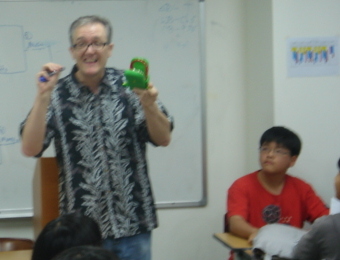
![]()
Caveat: 응!
I’m reaching a kind of landmark with my time in Korea.
Cumulatively, I have now spent more time living in Korea than I did in Mexico. And I wonder at the fact that my Korean is still so bad. Well, not really – there are clearly reasons my Spanish improved so fast when I lived in Mexico, that haven’t applied in this situation. I was much more immersed when I was in Mexico.
That year I spent here in Korea while I was in the Army was the opposite of immersion – my exposure to the language was minimal and my opportunities to study it virtually non-existent. And since I’ve been here this time, my work environment does not provide me with the opportunities I had when in Mexico. Then there’s the issue of the fact that a 20 year old brain is going to perhaps acquire language more efficiently than a 40 year old brain.
Yesterday I was learning the words 법 (beop) and 법률 (beomryul), both of which mean “law” in slightly different ways (one is a derivative of the other, and they relate semantically a little bit like the law/legal pair in English, I think).
But it wasn’t the meanings that threw me, but rather the fact that I still haven’t wrapped my mind around the allophonic (pronunciation) rule that says that in a syllable ending in -/p/ followed by a syllable beginning in /r/-, the -/p/ changes to a -/m/. I understand it phonologically – it follows well-documented, similar patterns found in many languages. It’s just hard to remember to do it. And if I forget to do it, the Korean listening to my speaking ends up hearing gobbledygook.
I did sort of work out a cute little aphorism for describing some essential, stereotypical difference between English and Korean pronunciation. As many know, in English, our “default” sound is a kind of very relaxed schwa sound that leaves the lips relaxed and slightly rounded – that “gaping uh” sound. Further, English has a lot of semivowels (like /r/ or “dark” /l/) that purse the lips out a little bit, as in a /w/ (which purses the lips a lot). Korean, meanwhile, seems to have as its “default” sound a kind of high, tense, unrounded vowel (hangeul 으, romanized as “eu” but /ɯ/ in IPA), and many consonants and vowels are much less rounded than in English, with the sides of the lips drawn back almost tightly. When trying to get Koreans to better pronounce sounds such as /r/ or /w/ in English, I’m constantly saying something like, “push your lips out.” And when they’re trying to help me better pronounce one of those difficult vowels, they’re saying something like, “pull your lips back tight.” Hence my aphorism: Korean is a smiling language, English is a kissing language. Hopefully you can visualize this.
Last summer I visited Arcata (my birthplace and hometown) and went out to Mad River Beach. This is a picture I took of a small stone and a sand dollar I saw lying in the sand in the sun in the surf.

![]()
Caveat: Carbon Amortization
I was reading an article about Priuses in the New York Times (online) that caused me to think, once again, about something I find very troubling about all the discussion of reducing the carbon footprints of the automobiles we drive, about legislating improved mileage and/or offering incentives to buyers of lower-carbon-footprint cars. And it is this: what about the carbon footprint of the manufacturing process? What about other environmental impacts of new cars? Bear with me, while I try to think this through.
Suppose I have a Hummer. It’s a nice, ecologically disastrous beast, with a very high carbon footprint, that I bought in a solipsistic moment some years back. I don’t know enough to actually assign a meaningful number to its day-to-day carbon footprint, but lets say its daily value is “10.” So, one morning, after a long talk with some friends, I wake up feeling guilty, and decide to buy a Prius. So I buy the Prius – and lets say, for the sake of argument, that its daily carbon footprint is “2” – i.e. it puts out 20% of the ongoing emissions as the Hummer.
But what was the carbon footprint of manufacturing the Prius? Is it unreasonable to imagine it might be some rather large number compared to the daily value? I mean, just the delivery from manufacturer to dealer is going to be some largish multiple of the daily footprint, e.g. 20 or 50, right? There’s steel, engine, tire manufacturing. And farther back, there’s high-paid executives and designing engineers at Toyota and their contractors, sitting in air-conditioned offices over years, making the Prius a reality. ALL of that is part of the vehicle’s carbon footprint. Is it unreasonable to imagine that the carbon footprint of the creation of that new Prius might not be, say, in the 1000’s? 10,000’s? What if I go out on a limb, and guess, say, 8000 “units”?
The consequence is as follows: I’m reducing my personal carbon footprint, by switching from Hummer to Prius, by 8 units per day. But the Prius’ manufacture entailed a footprint of 8000. So, that means I will have to own the Prius for 1000 days before I “break even” in terms of carbon footprint. That’s almost 3 years! Wouldn’t it be better for the environment to urge people to KEEP their current cars longer, rather than switch out to lower-footprint vehicles? This would be true regardless of the type of vehicle they currently own.
And I understand very well, I just pulled these numbers out of a hat, and the analysis could be extremely mistaken. But what I wonder about, is why don’t you ever see anyone doing this kind of analysis, in the media? And there are other issues – the Prius has a contingent of non-carbon-related environmental issues, around its high-tech manufacturing processes, and its massive array of batteries – these are not in any way resolved. What about battery disposal? What about the toxics involved in battery and plastics manufacture?
I cannot argue that in terms of real, long-term life-of-product carbon footprint, my father’s 1928 Ford Model A is lower than almost anything else on the road (or, er, in storage, at the moment), because of its under 20 mpg and “dirty” exhaust. But it nevertheless represents maximizing the utility of the manufactured object vis-a-vis its intended purpose. The carbon footprint of the car’s manufacture has amortized for 80 years now! Meanwhile, that self-righteous bastard driving the 2008 Prius, which replaced his 2005 Corolla, which replaced his 2000 VW, which replaced his 1992 Chevy, etc., etc., has left a landscape strewn with massive-manufacturing-footprint disposed-of vehicles. If he had kept each of his earlier vehicles for three or four years longer than he did, and avoided the Prius completely, he’d probably do more to reduce his carbon footprint than a lifetime’s worth of Prius driving.
I’m going to call this problem the problem of “carbon amortization.”
Below, is a picture of my mom, my sister, and me, with the family car, somewhere in Oregon, 1970.

My father still has this car. He hasn’t had it running in a few years, due to financial constraints, but I know he intends to drive it many more miles – as do I.
![]()
Caveat: Perhaps Dubya is the real Kira?
I have become substantially absorbed in the ongoing episodes of the manga series called Deathnote. I bought volumes 9, 10, and 11 on Sunday and have ploughed through two of them in the last two days.
These texts definitely have a lot going on in them, and I've decided it's quite a bit more than just a serialized graphic novel in the suspense/thriller genre. The main characters are quite complex, and moral ambiguity is pandemic – no one is faultless, and you can't even decide who the good guys are – as opposed to the bad guys – although the authors do tend show some of them in a more sympathetic light than others.
The central protagonist is Light (Raito) Yagami, an academically gifted Japanese teenager who's father is a career policeman. He gains the power to kill people by merely knowing their names and faces, and sets out to "make the world a better place." I won't go into the details of the plot and character development here – If you're interested, you can start at wikipedia or any number of other places on the internet to find out more.
From what I've read in my own explorations online, the authors did not specifically intend for the series to be philosophically deep, nor did they set out to create a semiotic masterpiece. The main writer (Ohba) explicitly states that he tried to avoid being "ideological" – whatever that means.
Nevertheless, the text is brimming with all kinds of tasty ideological morsels (and morasses) – to such an extent that I think it would be extremely fruitful and interesting to undertake an in-depth semiotic study of the text, perhaps something in line with Frederic Jameson's method, as he outlines in his seminal work, The Political Unconscious.
I can't help but be constantly aware of the geopolitical backdrop for the writing of the series – these times we inhabit, the first years of the 21st century. It's set in a Japan still basically attached to the U.S. strategically, but increasingly unrooted culturally and economically. The early books constantly had me flashing to the awkwardness of Japan's postwar identity, and also to the looming moral cypher that is represented by the United States' nuclear umbrella.
But in the most recent episodes I've been reading, I keep thinking about righteous hegemonies… about U.S. unilateralism, vis-a-vis the character of Kira (the machiavellian boy Light, who's become a demonic-powered avenger, Kira, but is also masquerading as one of his hunters, the character named "L"). In chapter 75 (book 9), Light says "If we catch Kira, then Kira is evil. If Kira rules the world, then Kira is good." To which Aizawa responds, "So the victor is righteous…" Which is to say, righteousness has less to do with morality than with might and victory. "Might is right."
And isn't that what's going on in Iraq, now? Isn't that what happened in Japan 60 years ago, for that matter? Yet there's a muddled moral imperative, however contrived, that drove both that old war and the one we are witnessing now. Personally, I continue to be compelled to reject those revisionists who insist there's some qualitative moral difference between any given war and any other. I have decided that Kira represents the exercise of inordinate power, whenever blinded by its own moralizing rationalizations. Yet one finds oneself sympathizing, at least sometimes, with those rationalizations. Because they're "rational," of course. And because Light-Kira is the protagonist.
I like the way that the authors exploit the graphic format, also. In book 11 there's this long, complex dialogic thing going on, involving a conversation between Light and Takada, who are speaking for the benefit of known eavesdroppers, but secretly supported and manipulated by notes being passed between them, and at the same time commented and subverted by the listeners, all in a chaotic progression of comic-book frames that becomes dizzingly non-linear.
Caveat: Champions
Two weeks ago we had a debate competition among the ER-ban students (advanced-level elementary). This was a kind of consummation of all my efforts, and overall I was pretty happy with how it went. Some of the students clearly enjoyed participating and put in a great deal of enthusiasm and effort, which was great to see.
The classes divided into teams of 3-5 students, and at the end of the competitions (one on Monday and one on Tuesday), each of the ER classes had a champion team. Here are some quick portraits of my champion teams.
 This is the ER2-Tuesday team. The most talented students, from the highest-level class. From left to right, that’s Tina, Christina, Maria, Cathy, and Stephanie. Tina is smart and a little goofy. She has a great sense of humor and is not afraid to try it out in English. Christina will someday be a famous cartoonist or manga author, and although she’s not intellectually inclined, her English is actually quite good. And she’s a great artist. Maria is brilliant and academically motivated. Not to mention brutally competitive. Cathy is one of those always-positive personalities that can make anyone around her happy, and never gives up. Little Stephanie, despite being several grades lower than the others, speaks phenomenal, idiomatic English and is quite thoughtful.
This is the ER2-Tuesday team. The most talented students, from the highest-level class. From left to right, that’s Tina, Christina, Maria, Cathy, and Stephanie. Tina is smart and a little goofy. She has a great sense of humor and is not afraid to try it out in English. Christina will someday be a famous cartoonist or manga author, and although she’s not intellectually inclined, her English is actually quite good. And she’s a great artist. Maria is brilliant and academically motivated. Not to mention brutally competitive. Cathy is one of those always-positive personalities that can make anyone around her happy, and never gives up. Little Stephanie, despite being several grades lower than the others, speaks phenomenal, idiomatic English and is quite thoughtful.
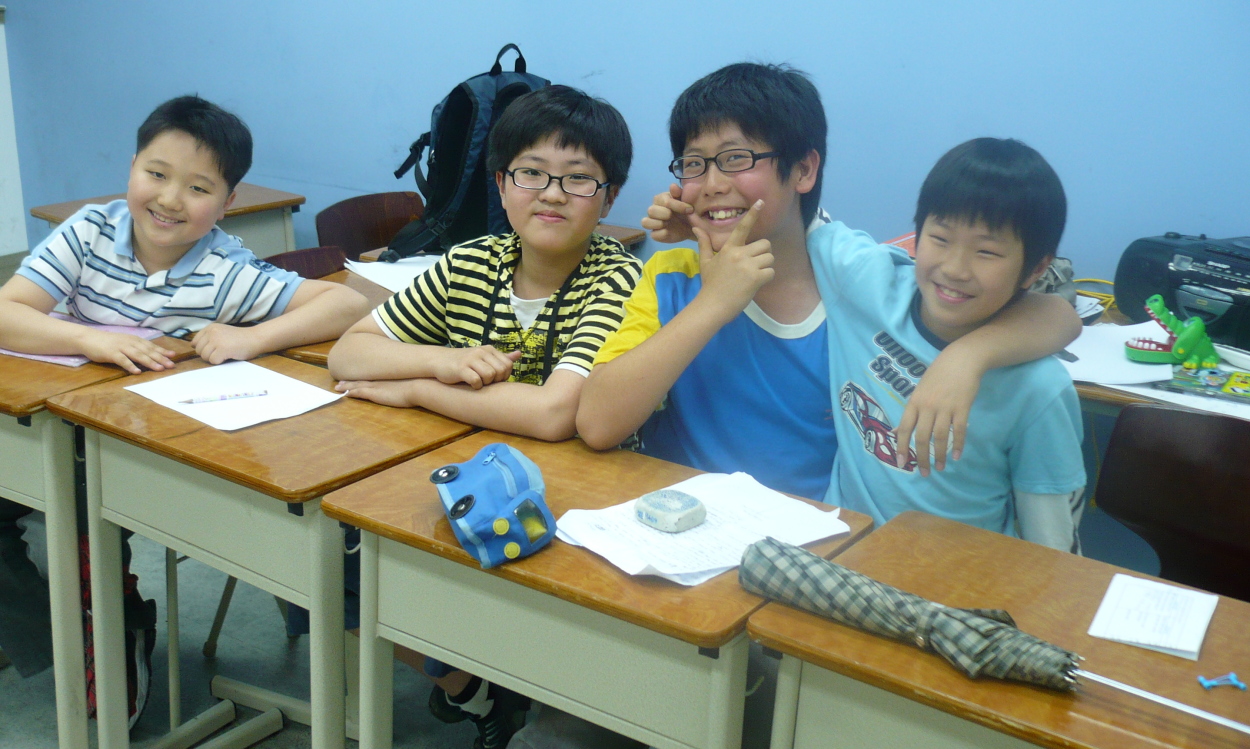 This is the ER1-Monday champion team. Actually, the reason they won was because John2 was visiting the Monday class from his home class, which was ER2-Tuesday. Otherwise the girls would have won this class championship. But they’re good guys, and I was happy to declare them the winners. From left to right, that’s Jake, John2, John1, and Joey. The ER1-Monday class has an informal tradition of making sure everyone’s English name starts with the letter J. Jake is extremely smart and very focused as a student, but needs to work on getting along better with his peers – he can seem kind of standoffish. But he reminds me of myself at a similar age. John2, as I said, was just visiting from the Tuesday “ban,” but he bonded quickly with the guys because they realized he was a huge asset to the team – he was only debater in the overall competition who actually spoke completely extemporaneously. John1 is the class goof, quite intelligent but uninterested in anything involving actual work. But he’s also almost always an asset to a class, because he’s constantly got something interesting or off-the-wall to say, to keep things entertaining. He says he wants to be either comedian or a doctor, but that he suspects being doctor involves “too much study.” Joey is moody but quite brilliant. He can often argue with his peers, but he also can surprise with his idiomatic, well-formed fragments of English.
This is the ER1-Monday champion team. Actually, the reason they won was because John2 was visiting the Monday class from his home class, which was ER2-Tuesday. Otherwise the girls would have won this class championship. But they’re good guys, and I was happy to declare them the winners. From left to right, that’s Jake, John2, John1, and Joey. The ER1-Monday class has an informal tradition of making sure everyone’s English name starts with the letter J. Jake is extremely smart and very focused as a student, but needs to work on getting along better with his peers – he can seem kind of standoffish. But he reminds me of myself at a similar age. John2, as I said, was just visiting from the Tuesday “ban,” but he bonded quickly with the guys because they realized he was a huge asset to the team – he was only debater in the overall competition who actually spoke completely extemporaneously. John1 is the class goof, quite intelligent but uninterested in anything involving actual work. But he’s also almost always an asset to a class, because he’s constantly got something interesting or off-the-wall to say, to keep things entertaining. He says he wants to be either comedian or a doctor, but that he suspects being doctor involves “too much study.” Joey is moody but quite brilliant. He can often argue with his peers, but he also can surprise with his idiomatic, well-formed fragments of English.
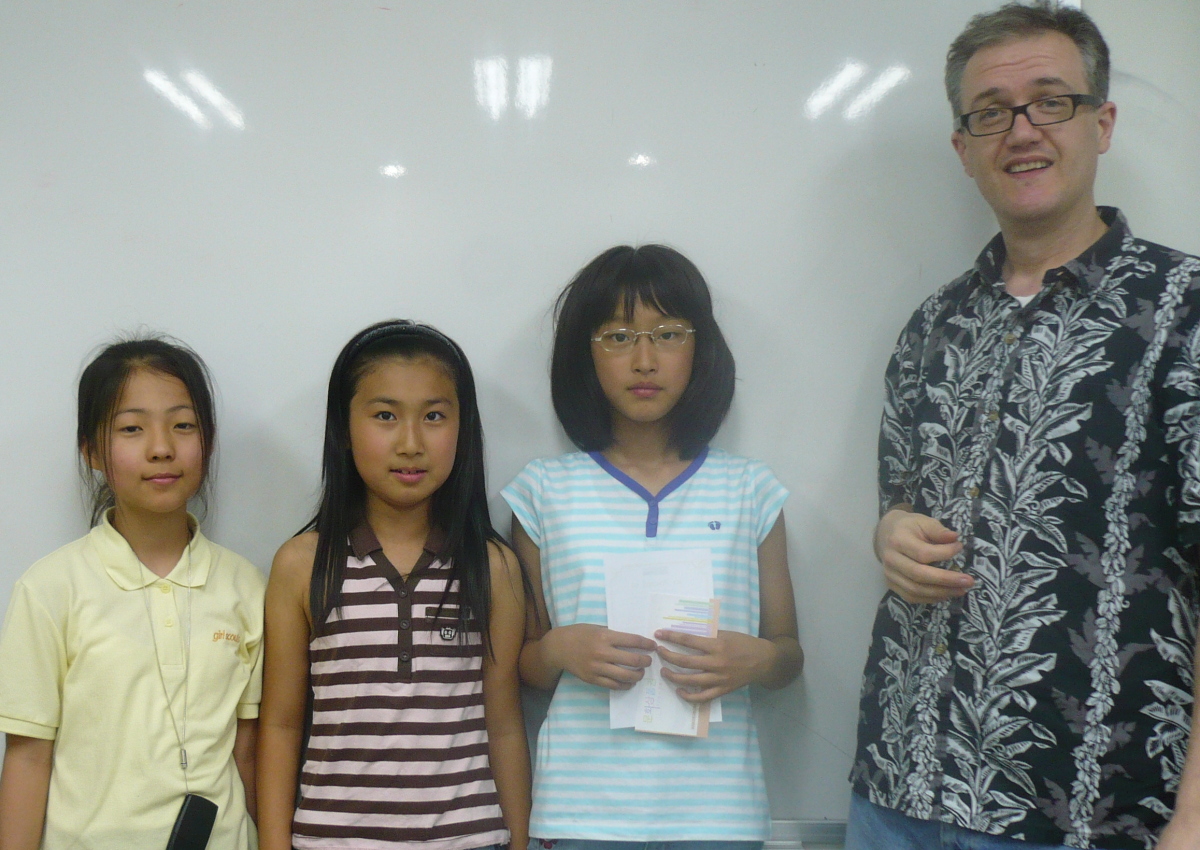 This is the ER1-Tuesday champion team. They weren’t perfect, but they were impressive partly because they managed with only three members. These girls are among my favorite students in the school They are, from left to right, Taylor, Gloria, and Ellen. And me, looking bemused and dorky, as usual. Taylor is an extroverted yet amazingly intellectual kid, with stunning enthusiasm and a true gift for not only learning but also pulling her peers along selflessly. Yet she can also demonstrate a very competitive spirit. She’s a natural leader – and if she keeps her confidence, might someday be a stunning success. She wrote all of Gloria’s speeches for the competition, and refused to take credit for them, but I saw her doing it. Gloria is a super friendly girl who often gives the impression of understanding more than she does. She just grins and nods and shrugs, and only later do I realize she was faking it. But she has managed to make friends with the two smartest girls in the class, and she leverages that friendship to her own academic benefit, I don’t think cynically, but just as if it’s part of the natural order of things. I actually think she would do just fine in an immersion environment, because although she lacks a lot of knowledge, she’s extroverted and has good non-verbal communicative competence. Lastly there’s Ellen. She initially can seem very shy, and she’s much less extroverted than the others. But she’s got a quiet confidence about her, and in any one-on-one conversation, she’s among the best in the entire school – and not just among the elementary students, but including the middle-schoolers too. It’s not so much her level of ability as the fact that she refuses to ever give up. She just circumlocutes and puzzles along until she’s made her point, whatever it is. She will never take the linguistic cop-out and leave you with “I don’t know” or “I can’t explain.”
This is the ER1-Tuesday champion team. They weren’t perfect, but they were impressive partly because they managed with only three members. These girls are among my favorite students in the school They are, from left to right, Taylor, Gloria, and Ellen. And me, looking bemused and dorky, as usual. Taylor is an extroverted yet amazingly intellectual kid, with stunning enthusiasm and a true gift for not only learning but also pulling her peers along selflessly. Yet she can also demonstrate a very competitive spirit. She’s a natural leader – and if she keeps her confidence, might someday be a stunning success. She wrote all of Gloria’s speeches for the competition, and refused to take credit for them, but I saw her doing it. Gloria is a super friendly girl who often gives the impression of understanding more than she does. She just grins and nods and shrugs, and only later do I realize she was faking it. But she has managed to make friends with the two smartest girls in the class, and she leverages that friendship to her own academic benefit, I don’t think cynically, but just as if it’s part of the natural order of things. I actually think she would do just fine in an immersion environment, because although she lacks a lot of knowledge, she’s extroverted and has good non-verbal communicative competence. Lastly there’s Ellen. She initially can seem very shy, and she’s much less extroverted than the others. But she’s got a quiet confidence about her, and in any one-on-one conversation, she’s among the best in the entire school – and not just among the elementary students, but including the middle-schoolers too. It’s not so much her level of ability as the fact that she refuses to ever give up. She just circumlocutes and puzzles along until she’s made her point, whatever it is. She will never take the linguistic cop-out and leave you with “I don’t know” or “I can’t explain.”
![]()
Caveat: Memorializing Insecurities
I just wrote this really long entry, and posted it, and it didn't show up.
In it, I talked (among other things) about my negative feelings about my teaching abilities – and then I said something to the effect of: I should stop memorializing my insecurities online, as it does me no good to dwell so much on the negative. So I think there's something karmic (or at the least apophenic) in the fact that the post failed to stick.
I was watching an episode of That '70's Show, recently, and the character Hyde says, "Oh my god, I've been using sobriety as a crutch!" I found this extremely funny and philosophically fascinating, too. It seems there's a human impulse to obsess negatively on almost anything: drugs or other classic addicitons, for sure, but also religion, politics, or even sobriety.
Caveat: Sith Master of Silicon Valley
I was reading a Forbes magazine article (byline Brian Caulfield and Wendy Tanaka 06.13.08) about the failure of the Microsoft-Yahoo deal and Yahoo's subsequent scramble for googlence, and one of the lines that stood out to me was a characterization of Larry Ellison (the wildly eccentric boss of Oracle Corp) as the "Sith Master of Silicon Valley." I liked the idea that this might be on target.
I'm a shareholder in Oracle, and furthermore, I hold an Oracle certification as a Database Administrator – which is ironic since all my actual DBA and development work has been with Microsoft's competing SQL Server product, for which I hold no certification.
Despite this, I am not a fan of their product line, exactly – it is about as baroque as a high technology product line can get and still function. The reason I bought stock in the company was, rather, because I saw first hand, during my years working with the Paradise Corp (a pseudonym) IT department the amazing ease with which Oracle's enterprise sales team took my employers for a multimillion dollar ride. A project which was started in 2003 is still going on, years after the original anticipated "go live" date, and as far as I know, it barely works if at all, and only with a zillion caveats (appropriate to mention, I suppose, for this blog).
I figured if all of Oracle's sales teams were half as effective as the ones working my IT higher ups at Paradise, that company had a locked down revenue stream for decades to come. So, through thick and thin, I remain a loyal Oracle shareholder – and among all my long-term holdings, it's been, overall, one of the most pleasing. Or maybe that's just the luck of jumping on (and off and on again) the bandwagon at the right time?
Caveat: My Life as a Multimillionaire
Sometimes I can't get over being a multimillionaire. In Korean currency, that is: there are about 1000 KRW to each dollar – so my Korean bank account has millions at the moment. It seems like so much, with all those zeros!
But actually, I'm living quite modestly, of course. And the stock market hasn't been my friend, either. Since my last comment on investments, some months back, things have been pretty level for me, but there's been no leap forward either. Ah well – it's all a bit like gambling, I suppose.
The point is (as I explained to my accountant): I'm kind of living a "vow of poverty" in a weird, nonreligious way. A secular monk. And I'm cool with that – I find money issues generally annoying if not downright depressing.
I did finally buy a new MP3 player yesterday. I got a tiny 2GB Samsung product called "Yepp." I knew I wanted to go "generic" – to avoid the greater and lesser Satans. Microsoft is the greater Satan, of course - and this requires no explanation. But many people don't understand why I consider Apple (and iStuff) to be the lesser Satan. I guess it's a matter of content over hype – I still harbor this old feeling of betrayal when the transparent, essentially "open source" hardware known as Apple II was replaced by the hyped-black-box concept called Mac. Apple II was my first computer. And I learned 6502 Assembly language on it, and how to hack Apple's DOS. It was a great learning experience and converted me, for ever and ever, to the open-box philosophy, vis-a-vis computers, anyway.
The weather has been steamy and summery lately, but today the humidity is lower and it's quite pleasant. I'm going to work at having a positive attitude, a la "The Secret" – so hyped by Oprah and on the internet.
Caveat: The Beef
There have been massive and ongoing protests here in Korea over the government's efforts to comply with what should have been a rather routine resumption of imports of U.S. beef. Most international analyses of this situation that I have seen focus on the fact that it is about more than beef, but that it's not necessarily simple anti-Americanism either. Something in-between: it's about authority and control – meaning, whether or not South Korea can or should yield to American pressure to resume imports, or whether it should stand on its own authority and resist.
I find this intriguing, given my own neverending saga over the question of authority and how to deploy it successfully in my current work environment. This evening, I became frustrated because I felt that one of my coworkers had undercut my authority by telling me, in front of a student, that maybe I shouldn't make them stay late to finish homework (a fairly common form of mild discipline for students who don't complete their work). This set me up, since to make the student stay at that point I was not only being "unfair" to the student but also ignoring the plea for compassion from one of the student's other teachers.
When I complained about this, the response was: oh, we're not undercutting your authority. And a demand for concrete examples of other times I felt this occurred, since I had worded my complaint rather broadly, and said that I felt my authority was "frequently undercut." This wasn't wise of me, as arguments with my one supervisor always seem to devolve into arguments of the factuality of my complaints – a good strategy on his part, since the burden of proof is on the complainer.
Regardless of the wisdom my complaint, I found myself feeling especially put off by a suggestion that somehow the only reason I lacked authority with my students is because I somehow don't have the creativity or force of personality to make that authority for myself. And coming home and looking at the news, I started to think about the radically different relationships American and Korean cultures cultivate with respect to the concept and practice of authority. All of which is to say, I'm aware that there's a cultural gap underlying the communication gap, which is brought to the fore by the "authority" gap that I'm experiencing everyday. And I have no idea how to proceed.


